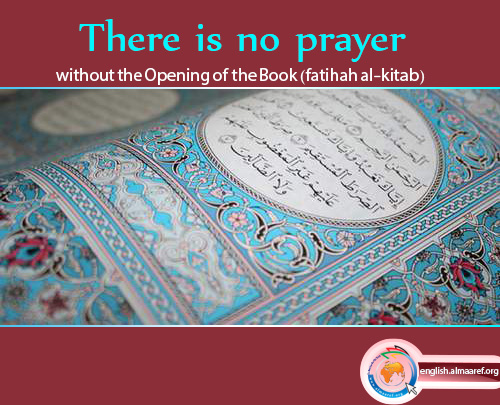After the recital of Takbirah al-Ihram, Surah al-Fatihah is to be recited and if
this surah is not recited in the prayer, the prayer is invalid. “There is no
prayer without the Opening of the Book {fatihah al-kitab}.”1
The other name of this surah is the Opening of the Book {fatihah al-kitab}
because the Qur’an begins with this surah. This surah has seven verses2
and according to the tradition of the Most Noble Messenger (pbuh&hh) on the
authority of Jabir ibn ‘Abd Allah al-Ansari, it is the best surah of the Qur’an.3
Surah al-Fatihah is the only surah which is obligatory upon every Muslim to
recite at least ten times daily in his five obligatory prayers.
Concerning the importance of this surah, it is enough to say that it is narrated
in the traditions: “If you recite this surah 70 times for the dead person and
he revives, do not be surprised.”4
From the name, “Opening of the Book” {fatihah al-kitab} of this surah,
it is clear that all the verses of the Qur’an were compiled during the time of
the Prophet (pbuh&hh) and formed into a book and at his order this surah was
placed at the beginning of the Book. The verses of the blessed Surah al-Hamd
(or, Fatihah) are about God and His attributes, the issue of the Resurrection {ma‘ad},
request for guidance on the path of truth, and the acceptance of the sovereignty
{hakimiyyah} and lordship {rububiyyah} of God.
Also, in this surah we express our interest to tread the path of the saints of
God and aversion and disavowal of the misguided ones and those who have earned
the divine wrath.
Surah al-Fatihah is the source of remedies, a cure for both physical ailments
and spiritual maladies. In his book, Tafsir Fatihah al-Kitab, the late ‘Allamah
Amini has narrated many traditions in this regard.
The instructive lessons of Surah al-Fatihah
1. By reciting Surah al-Fatihah, man cuts his hope from other than
God by saying, “Bismillah” {In the Name of Allah}.
2. By saying “Rabbi’l-‘alamin” {Lord of all the worlds} and “Maliki yawmi’d-din”
{Master of the Day of Retribution}, he feels that he is the servant {marbub}
and the one who is ruled {mamluk}.
3. By reciting the phrase, “Rabbi’l-‘alamin,” he establishes a connection
between himself and the universe.
4. By “Ar-rahmani’r-rahim” {the All-beneficent, the All-merciful}, he
see himself under the aegis of His vast favor.
5. By “Maliki yawmi’d-din” {Master of the Day of Retribution}, his
negligence of the Day of Resurrection will be erased.
6. By “Iyyaka na‘bud” {You {alone} do we worship}, he abandons his
selfishness and desire for fame.
7. By “Iyyaka nasta‘in” {to You {alone} do we turn for help}, he removes
from his mind the idea of seeking help from other than God.
8. By “An‘amta ‘alayhim” {You have blessed}, he understands that the
distribution of favors lies in His hand and envy must be abandoned because the
envious one in reality is not satisfied with God’s manner of deciding on and
allocating sustenance.
9. By “Ihdina’s-sirata’l-mustaqim” {Guide us on the straight path}, he
wants to ask for firmness in treading the path of truth.
10. By “Sirat alladhina an‘amta ‘alayhim” {the path of those whom You have
blessed}, he declares his solidarity with those who have traversed the way
of God.
11. And finally, by “Ghayri’l-maghdubi ‘alayhim wa la’d-dallin” {such as
have not incurred Your wrath, nor are astray, he declares disavowal of falsehood
and the people of falsehood.}
* Source: A Commentary on Prayer by Muhsin Qara’ati
1- Mustadrak
al-Wasa’il, hadith 4365.
2- The number “seven” is the number of the heavens, the days of the week, the
circumambulation {tawaf} of the Ka‘bah, sa‘i {brisk walking or jogging} between
the mounts of Safa and Marwah, and the number of stones to be thrown at the
representations of Satan during the Hajj rituals.
3- Tafsir Kanz ad-Daqa’iq.
4- Bihar al-Anwar, vol. 92, p. 257.

















